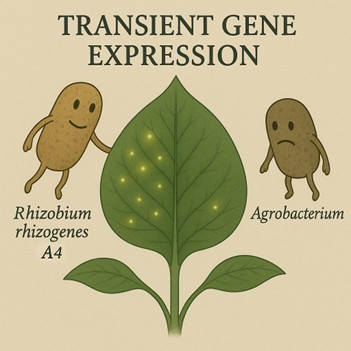[Chih-Hang Wu/Erh-Min Lai/Chih-Horng Kuo] A Powerful New Tool for Plant Gene Research: Rhizobium rhizogenes Strain A4 Shows Superior Performance in Gene Delivery
POST:Agroinfiltration is a widely used technique in plant gene research. It involves using bacteria to temporarily introduce foreign genes into plant leaves, allowing scientists to observe how these genes function within the plant quickly. Traditionally, the most commonly used bacterium for this purpose has been Agrobacterium tumefaciens. However, our recent research has revealed that a strain of Rhizobium rhizogenes, a relative of A. tumefaciens, performs even better. This study was published on April 9, 2025, in Plant Biotechnology Journal.
R. rhizogenes has mainly been studied for its ability to induce “hairy roots” in plants, but its potential to deliver genes into leaves has not been well explored. In this study, we tested several bacterial strains on Nicotiana benthamiana, a widely used model plant in laboratories. We found that strain A4 of R. rhizogenes triggered stronger and faster gene expression than any other tested strain. Building on the genomic information of A4, we developed a series of modified, disarmed strains with no pathogenic effects. These new strains demonstrated outstanding performance in experiments: they could efficiently introduce genes into older plant leaves, something many standard strains struggle with, and outperformed widely used laboratory strains like GV3101 and C58C1. Moreover, in crops such as tomato, pepper, and eggplant that are typically difficult to use for transient gene expression, these A4-derived strains also delivered excellent results.
This breakthrough provides plant scientists with a more flexible and efficient tool for gene function studies. It holds particular promise for research and breeding in solanaceous crops, accelerating crop improvement, and promoting sustainable agriculture.
This study was supported by the Grand Challenge Program of Academia Sinica and represents a collaborative effort among the laboratories of Dr. Chih-Hang Wu, Dr. Erh-Min Lai, and Dr. Chih-Hong Kuo at the Institute of Plant and Microbial Biology. The co-first authors are both students in the Taiwan International Graduate Program on Molecular and Biological Agricultural Science (TIGP-MBAS), including Juan Carlos Lopez-Agudelo and Foong-Jing Goh (currently a postdoctoral researcher at the Biodiversity Research Center of Academia Sinica).
